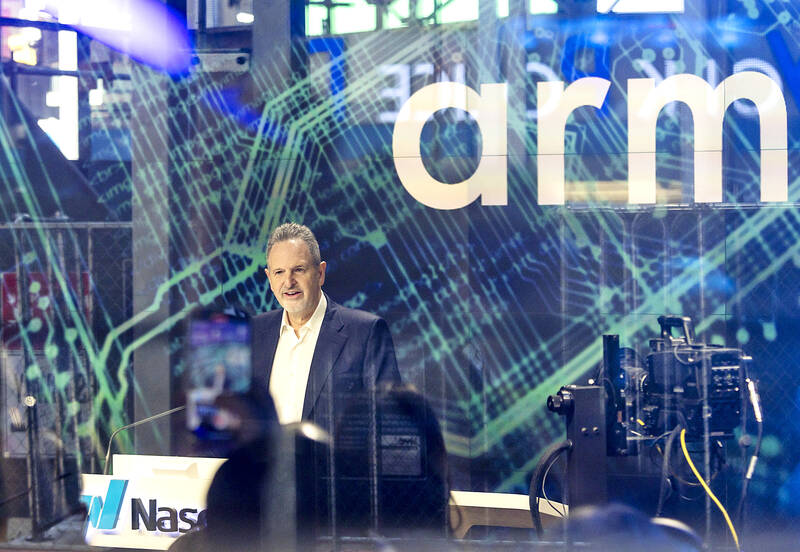Arm Holdings PLC soared 25 percent in its trading debut after raising US$4.87 billion in the year’s biggest initial public offering, delivering a boost for both equity markets and Softbank Group Corp founder Masayoshi Son.
Shares of the chip designer, still 90 percent owned by Softbank, closed at US$63.59 in New York trading on Thursday, giving Arm a market value of more than US$65 billion. Including restricted share units, Arm’s fully diluted valuation is closer to US$68 billion.
Arm on Wednesday sold US$95.5 million American depositary shares at the top of a marketed range of US$47 to US$51 each. The shares opened trading on Thursday at US$56.10 and rose as much as 30 percent.

Photo: EPA-EFE
The debut stands as a vindication for Son, Softbank’s chairman and chief executive officer. In a final meeting on Wednesday, some bankers and executives made the case for pricing the shares above the marketed range, but Son said it was not worth risking a healthy debut for US$100 million or so in additional proceeds, Bloomberg News reported.
With Thursday’s gains, the value of Softbank’s stake has increased by about US$12 billion.
Softbank’s shares rose as much as 5.1 percent during early morning trade in Tokyo yesterday, in their biggest intraday gain in three months.
Investors in the initial public offering (IPO) included some of Arm’s biggest customers. The company set aside more than US$700 million of its stock for Taiwan Semiconductor Manufacturing Co (台積電), MediaTek Inc (聯發科), Intel Corp, Apple Inc, Nvidia Corp and Samsung Electronics Co.
Arm’s listing is the largest in the US since electric vehicle maker Rivian Automotive Inc’s US$13.7 billion offering in October 2021.
The IPO is also set to rank among the tech industry’s largest-ever, though still well below the two biggest: Alibaba Group Holding Ltd’s US$25 billion 2014 offering and 2012’s US$16 billion debut by Meta Platforms Inc, then known as Facebook Inc.
The listing surpassed the US$4.37 billion raised in May by Johnson & Johnson consumer health spin-off Kenvue Inc to become this year’s top offering in the US.
Arm’s debut could serve as a catalyst for IPOs from dozens of tech start-ups and other companies whose plans to go public in the US have been stuck during the deepest, longest listing trough since the financial crisis in 2009.
Online grocery-delivery firm Instacart Inc and marketing and data automation provider Klaviyo are set to price their IPOs next week. Vietnam-based Internet start-up VNG Ltd and footwear maker Birkenstock Holding Ltd are also among those that have also filed to go public.
“This is just the beginning of the cycle and Arm is a great sign of what’s to come,” said Ross Gerber, cofounder and CEO of wealth management firm Gerber Kawasaki Inc. “The pricing is a big part of it, Softbank was smart to price it where they did because they got a pop and drew investors in.”
Arm CEO Rene Haas said in an interview on Bloomberg TV that the company, which is based in Cambridge, England, is open to considering a listing in the UK.

Semiconductor shares in China surged yesterday after Reuters reported the US had ordered chipmaking giant Taiwan Semiconductor Manufacturing Co (TSMC, 台積電) to halt shipments of advanced chips to Chinese customers, which investors believe could accelerate Beijing’s self-reliance efforts. TSMC yesterday started to suspend shipments of certain sophisticated chips to some Chinese clients after receiving a letter from the US Department of Commerce imposing export restrictions on those products, Reuters reported on Sunday, citing an unnamed source. The US imposed export restrictions on TSMC’s 7-nanometer or more advanced designs, Reuters reported. Investors figured that would encourage authorities to support China’s industry and bought shares

TECH WAR CONTINUES: The suspension of TSMC AI chips and GPUs would be a heavy blow to China’s chip designers and would affect its competitive edge Taiwan Semiconductor Manufacturing Co (TSMC, 台積電), the world’s biggest contract chipmaker, is reportedly to halt supply of artificial intelligence (AI) chips and graphics processing units (GPUs) made on 7-nanometer or more advanced process technologies from next week in order to comply with US Department of Commerce rules. TSMC has sent e-mails to its Chinese AI customers, informing them about the suspension starting on Monday, Chinese online news outlet Ijiwei.com (愛集微) reported yesterday. The US Department of Commerce has not formally unveiled further semiconductor measures against China yet. “TSMC does not comment on market rumors. TSMC is a law-abiding company and we are

FLEXIBLE: Taiwan can develop its own ground station equipment, and has highly competitive manufacturers and suppliers with diversified production, the MOEA said The Ministry of Economic Affairs (MOEA) yesterday disputed reports that suppliers to US-based Space Exploration Technologies Corp (SpaceX) had been asked to move production out of Taiwan. Reuters had reported on Tuesday last week that Elon Musk-owned SpaceX had asked their manufacturers to produce outside of Taiwan given geopolitical risks and that at least one Taiwanese supplier had been pushed to relocate production to Vietnam. SpaceX’s requests place a renewed focus on the contentious relationship Musk has had with Taiwan, especially after he said last year that Taiwan is an “integral part” of China, sparking sharp criticism from Taiwanese authorities. The ministry said

US President Joe Biden’s administration is racing to complete CHIPS and Science Act agreements with companies such as Intel Corp and Samsung Electronics Co, aiming to shore up one of its signature initiatives before US president-elect Donald Trump enters the White House. The US Department of Commerce has allocated more than 90 percent of the US$39 billion in grants under the act, a landmark law enacted in 2022 designed to rebuild the domestic chip industry. However, the agency has only announced one binding agreement so far. The next two months would prove critical for more than 20 companies still in the process